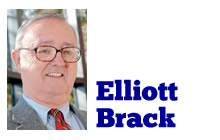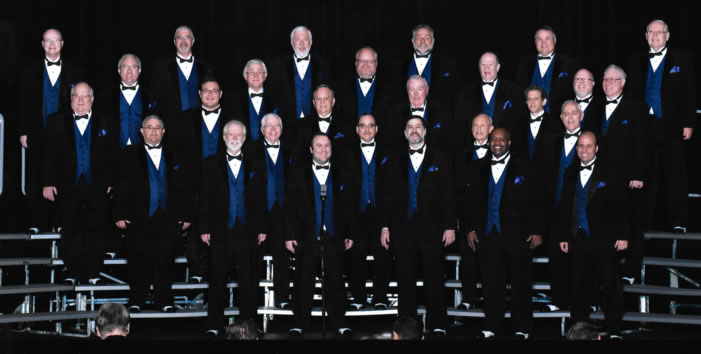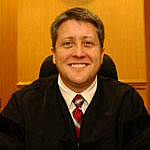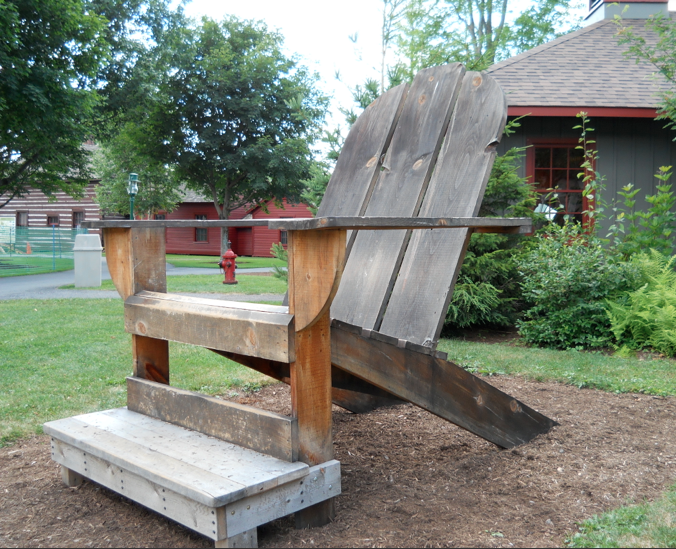CONCERT FOR CHARITY: The chorus and quartets from the Stone Mountain Barbershop Chorus will present an afternoon of barbershop harmony to benefit the Southeast Gwinnett Cooperative Ministry during the “back to school” campaign to replenish their pantry shelves. The festivities will take place on Saturday, August 13, at 3:30 p.m. at Grayson United Methodist Church, 555 Grayson Parkway. Laura Drake, director of the local food cooperative, has listed the following items as being in particularly short supply: dry beans, canned fruit, canned chili, soup (tomato, beef, vegetable), grits and canned vegetables (except green beans). Admission to the event is either $10 cash or 10 pantry items per person. A similar benefit conducted in January 2015 resulted in the food cooperative receiving a record of both cash and pantry item donations.
IN THIS EDITIONTODAY’S FOCUS: Judge Explains Why Gwinnett Will Participate in Business Court Model
EEB PERSPECTIVE: That Brit System of Picking a New Leader Can Have Its Advantages
ANOTHER VIEW: Looks to Democratic Economic Policies To Signal Nation’s Recovery
SPOTLIGHT: The Gwinnett Braves
FEEDBACK: Found Interest on Article from Encyclopedia about George Peabody
UPCOMING: Two Named To Head New Physical Therapy Education Program at PCOM
NOTABLE: County Seeks To Improve Operations of Gwinnett County Transit
RECOMMENDED: Aspirations of the Heart, by Katie Hart-Smith
GEORGIA TIDBIT: Union Forces Block Chattahoochee River, Causing CSA Problems
TODAY’S QUOTE: Here’s the Greatest Lesson That All Old People Share
MYSTERY PHOTO: Lots of Readers (19) Easily Spot Recent Mystery Photo
LAGNIAPPE: Rocking a Giant Sweet Potato
TODAY’S FOCUSJudge explains why Gwinnett will participate in business court model
(Editor’s Note: Last week Gwinnett County announced that the county would participate in a Business Court. (See GwinnettForum of July 22). Knowing that some Gwinnettians did not understand the formation of a Business Court, we asked Superior Court Judge Randy Rich, who will direct the court along with State Court Judge Joseph Iannazzone, for an explanation.—eeb)
By Randy Rich, judge, Superior Court of Gwinnett County
LAWRENCEVILLE, Ga. — How fast the trial calendar moves is critical to the resolution of cases. Unfortunately, there are usually several obstacles.
First, the newest cases are at the bottom of the civil trial calendar. In Superior Court, you may be behind divorce cases, land use cases, or custody disputes. In State Court, you may be behind credit card cases, garnishments, or landlord tenant disputes. To make matters worse, your civil trial may not be reached quickly because of the volume of criminal trials your judge must also hear.
Generally, the criminal trials take priority over the civil trials because of speedy trial issues, or cases where the Defendant has been in custody awaiting his day in court.
Business courts prioritize the resolution of complex civil disputes. In some states, a select few business court judges travel circuits in order to devote all of their time to the business court docket. In Georgia, the judges themselves accept the added caseload to their docket and agree to devote the additional docket time necessary to resolve the disputes quickly. Fulton County also uses senior judges to assist with the extra docket time required.
Business Court was created to expedite business disputes with the idea that commerce, ongoing construction, or a complicated commercial transaction had to be resolved, despite the dispute, and the dispute needed to resolved as quickly as possible.
For example, if a hotel is under construction when a dispute arises, the hotel construction still must move forward and an expedited docket can help get the legal issues solved more quickly.
Fulton judges would only hear Fulton cases. Gwinnett judges would only hear Gwinnett cases. A judge who might not have docket time for a complex business suit would send it to me and I would make time to include it in my docket so it could be fast tracked if needed.
Usually this is done during lunch hours. The business court idea has been around for 10 years or so in most states.
EEB PERSPECTIVEThat Brit system of picking a new leader can have its advantages
By Elliott Brack, editor and publisher
JULY 26, 2016 | While the United States has been focused on campaigning for the presidency all of 18 months, look what took place in Great Britain in the last few weeks.
 The English voted by a 52-48 percent margin that they wanted out of the European Union, ready to go on their own. That was June 23. Then the prime minister resigned the next day.
The English voted by a 52-48 percent margin that they wanted out of the European Union, ready to go on their own. That was June 23. Then the prime minister resigned the next day.
Meanwhile, candidates to replace the former prime minister were falling by the wayside. By July 14 Theresa May was the only candidate remaining, and became the new prime minister. That was only three weeks after the voting that felled the previous prime minister, David Cameron. Ms. May had chosen her new cabinet leaders and was well on her way. She soon was participating in European matters. And there has been little down time in England for in-depth discussion of all that is happening.
Wow! That British government system and leaders can change quickly!
Meanwhile, our country was still sloughing through the run-up to the Republican convention, which ended Friday. Now we face another week of convention bamboozling, this time with the Democrats making the noise. We are still more than three months away from voting for the new president. And he or she won’t take office for two more months after that.
No doubt about it, in our governmental system, we are the turtle, not the hare.
The British speed of getting a new head of government makes the American system seem stodgy and old-fashioned. Yet that’s our method, overtly slow and long-continuing.
This year it has seen some mighty flips-and-flops in a short time. Some 16 other Republican candidates have seen their presidential hopes vanish, while four Democrats were finding their upward-bound hopes in jeopardy. Now basically two major candidates remain, with the second to get confirmed this week.
All this means that only on August 4 (after the Democratic nomination), will be just the official start of the actual presidential campaign!
Imagine how this long campaign must certainly drain the physical strength of the campaigners and their staffs. It’s a long, long race that not only fatigues the professionals, but the ordinary citizens, too. We are all about bushed from the rhetoric and bashing of the candidates.
The long American campaign has another element: we lack getting much focus on significant news events. The campaign dominates the news cycle. It’s hard to find other interesting, and sometimes most important, stories, except the continuing bombings and shootings. We are all just caught up in the electioneering process.
It makes you wonder will this long campaign this year, with its unusual methods, cause more people than normal to stay away from the polls. Will they be just fed-up with the steady diet of minutia from news media about the candidates, so they will simply not vote? Or will they vote, but not for the major candidates, perhaps the Libertarian, in a show of disgust?
The United States and its democracy, we feel, is the best system to have people govern themselves in the world. Yet getting there is not pretty, and not easy. And that’s just the campaigning, not the governing itself.
Let’s admit it: the system used in England has its merits. It may not be as democratic as we would like it, but it works for them.
ANOTHER VIEWLooks to Democratic economic policies to signal nation’s recovery
By George Wilson
JULY 16, 2016 | The Republican ideology-driven policy of austerity at a time of unemployment and low interest rates has been a drag on the economic recovery of the United States from the great recession that started doing the last Republican administration.
![]() Fortunately, some Obama and Democratic inspired spending got through and a recovery of the economy has taken place. The recovery could have been faster and resulted in lower unemployment and a lower deficit if Democratic policies had been implemented fully.
Fortunately, some Obama and Democratic inspired spending got through and a recovery of the economy has taken place. The recovery could have been faster and resulted in lower unemployment and a lower deficit if Democratic policies had been implemented fully.
For the skeptics, contrast this with countries in Europe, especially Great Britain, which followed a more conservative policy and got slower growth. I’m hoping that a Democratic victory signals a period of loose fiscal policy, which we will need as we head towards the historical limits of a recovery.
Spending is not the problem. Tax policy (tax cuts for the rich), unpaid wars and austerity are the problems. We need to take advantage of low interest rates and rebuild our infrastructure.
However, saner and effective economic policies may be killed by voter suppression laws, gerrymandering and the Citizens United ruling that allowed for unlimited spending by the one percent, that will insure that the Republicans will retain control of the House of Representatives where spending bills have to originate.
IN THE SPOTLIGHTThe Gwinnett Braves
 The public spiritedness of our sponsors allows us to bring GwinnettForum.com to you at no cost to readers. The Gwinnett Braves are the Triple-A International League affiliate of the Atlanta Braves. The team plays their home games at Coolray Field, located on Georgia Highway 20 just east of the Mall of Georgia. Another season of family-friendly fun and kid-friendly activities is in full swing! Highlights of the Promotional Schedule for August include Friday Night Fireworks (presented by Fox 5 Atlanta) after the games on August 12 and August 19, the John Schuerholz Bobblehead Giveaway (presented by Coolray Heating and Cooling) and “Faith & Family Night/Military Appreciation Night” on August 13, and the Chopper the Groundhog Bobblehead Giveaway (presented by Georgia Power) on August 20. The full 2016 Promotional Schedule is online at GwinnettBraves.com.
The public spiritedness of our sponsors allows us to bring GwinnettForum.com to you at no cost to readers. The Gwinnett Braves are the Triple-A International League affiliate of the Atlanta Braves. The team plays their home games at Coolray Field, located on Georgia Highway 20 just east of the Mall of Georgia. Another season of family-friendly fun and kid-friendly activities is in full swing! Highlights of the Promotional Schedule for August include Friday Night Fireworks (presented by Fox 5 Atlanta) after the games on August 12 and August 19, the John Schuerholz Bobblehead Giveaway (presented by Coolray Heating and Cooling) and “Faith & Family Night/Military Appreciation Night” on August 13, and the Chopper the Groundhog Bobblehead Giveaway (presented by Georgia Power) on August 20. The full 2016 Promotional Schedule is online at GwinnettBraves.com.
- Follow the G-Braves at twitter.com/GwinnettBraves and facebook/com/GwinnettBraves1. Ticket packages are on sale now, call 678-277-0340 or visit GwinnettBraves.com/tickets.
- For a list of other sponsors of this forum, go to: Our sponsors.
Found interest on article from Encyclopedia about George Peabody
Editor, the Forum:
![]() The article about the philanthropist George Peabody was read by me with interest. I grew up in New Haven, Conn., the home of Yale University and its Peabody Museum.
The article about the philanthropist George Peabody was read by me with interest. I grew up in New Haven, Conn., the home of Yale University and its Peabody Museum.
Because curious minds need to know, I wondered if Mr. Peabody, whose family was native to New England, had anything to do with the Peabody Museum. Sure enough, his nephew Othniel Charles Marsh “persuaded his uncle” to include Yale in his philanthropies.
In 1866 the Peabody Museum of Natural History at Yale University was founded with a gift of “….$150,000 for the construction of a museum building and the care and increase of the museum and its collections.” (From the Peabody Museum’s website.)
The nephew went on to become a professor of Paleontology at Yale, and a curator of the museum, where he used the inheritance from Uncle George to add large collections of vertebrate skeletons, vertebrate and invertebrate fossils, fossil footprints, and archaeological and ethnological artifacts to the Peabody Museum’s holdings.
Thank you for an interesting article and a fond memory from my home town!
— Cathy Ramadei, Duluth
Dear Cathy: Yes, we really enjoy finding articles from the fabulous Georgia Encyclopedia. It was the first digitally born online encyclopedia, and has continually updated itself since inception, and has a great search engine to find interesting tidbits about Georgia. -eeb
Wow! We don’t get many comments like this one
Editor, the Forum:
I read every issue, even if I don’t research the mystery photos. Your inclusion of George Graf’s research efforts was inspiring! Excellent balance and honest journalism in Gwinnett Forum…
— Michael Green, Milton
Dear Michael: As Foyle would say, “Honored.”—eeb
- Send us your thoughts: We encourage you to send us your letters and thoughts on issues raised in GwinnettForum. Please limit comments to 200 words. We reserve the right to edit for clarity and length. Send feedback and letters to: elliott@brack.net
Two named to head new physical therapy education program at PCOM
Preparing to implement a new physical therapist education program in Suwanee, Georgia Campus – Philadelphia College of Osteopathic Medicine (GA-PCOM) has welcomed a founding program director, as well as a director of clinical education.
Phillip Palmer, PT, PhD, recently assumed the role of founding director of the physical therapy program at GA-PCOM. He will serve as professor and chair of the college’s department of physical therapy. With 40 years of experience in physical therapy (PT), Dr. Palmer has practiced at hospitals and outpatient centers in Texas, Georgia, and in the Middle East. He has also taught at the Medical College of Georgia in Augusta, at Hardin-Simmons University in Abilene, Texas, and at the University of North Georgia in Dahlonega. His research interests include teaching/learning effectiveness and issues related to rehabilitation for cancer survivors.
Carol Miller, PT, PhD, has joined the staff as professor and director of clinical education. In this position, she will coordinate clinical sites for GA-PCOM’s physical therapy curriculum. Dr. Miller is a board-certified clinical specialist in geriatrics (GCS) from the American Board of Physical Therapy Specialties. With extensive experience in the rehabilitation, sub-acute and outpatient care settings, her areas of clinical expertise include geriatrics, especially amputee management, gait analysis and balance/fall risk, diabetic foot care, and arthritis/osteoporosis management.
Drs. Palmer and Miller are currently working on the program’s application for candidacy, which will be submitted to the Commission on Accreditation in Physical Therapy Education (CAPTE) on December 1, 2017 as a requirement in the pre-accreditation stage. According to CAPTE, there are no guarantees that the program will be granted Candidate for Accreditation status. If candidacy is granted, GA-PCOM will be approved to admit its first cohort of students to the physical therapy program for the summer term of 2018. CAPTE also states, “Though achievement of Candidate for Accreditation status signifies satisfactory progress toward accreditation, it does not assure that the program will be granted accreditation.”
Deal to be summer commencement speaker at GGC
Summer commencement speaker for Georgia Gwinnett College at its August 2 ceremony will be Georgia’s First Lady, Sandra Deal. About 150 students will receive bachelor’s degrees at the event, which will be held at 10 a.m. at the Infinite Energy Center arena in Duluth. The daughter of educators, Deal has dedicated her life to encouraging childhood education. As a Georgia public school teacher, she taught for more than 15 years, and retired as a sixth grade middle school teacher in Hall County. Mrs. Deal grew up in Gainesville and graduated from Georgia College and State University, where she is a member of the board of trustees. The Deals have been married for 49 years and have four children and six grandchildren. They are members of First Baptist Church in Gainesville.
NOTABLECounty seeks to improve operations of Gwinnett County Transit
The Board of Commissioners were on board recently when it came to approving agenda items related to improved service on Gwinnett County Transit.
![]() First the Board approved spending about $60,000 in County funds to upgrade the Park and Ride lot at Sugarloaf Mills. Federal and state funds cover the balance of the contract, which totals close to $1.66 million, with Archimetric Design and Construction Inc. This project will redesign the existing Sugarloaf Mills Park and Ride express bus passenger loading lane to accommodate an additional bus lane and a small fare building. Turn lanes, a new traffic signal and sidewalks are also included in this project.
First the Board approved spending about $60,000 in County funds to upgrade the Park and Ride lot at Sugarloaf Mills. Federal and state funds cover the balance of the contract, which totals close to $1.66 million, with Archimetric Design and Construction Inc. This project will redesign the existing Sugarloaf Mills Park and Ride express bus passenger loading lane to accommodate an additional bus lane and a small fare building. Turn lanes, a new traffic signal and sidewalks are also included in this project.
The Board also approved the purchase of five 40-foot clean diesel buses as part of future plans to expand local bus service. The bus buy was through a consortium from Gillig LLC for $2.3 million. Federal funds provide 80 percent of the funding; the County’s share is $461,641.
Commissioners also agreed to the replacement of seven paratransit vehicles at a cost of $533,351 from National Bus Sales. These paratransit vehicles are 25 feet long and can carry 14 passengers. Federal transit funds cover 80 percent of this cost as well, with the County’s share being $106,670.20. These vehicles are to arrive in 2017.
Norcross firm wins first Mystery Shopper’s Choice Award
A Norcross-based company, A Closer Look (ACL), is an inaugural Shopper’s Choice Award Winner in the 2016 competition voted on by shoppers across North America. A Closer Look is one of the top mystery shopping providers in the entire mystery shopping industry as voted on by North American mystery shoppers.
Chuck Paul, president and co-founder of A Closer Look, says: “It is an honor to be recognized as one of the top mystery shopping providers in the entire industry.” A Closer Look (ACL) has been in operation for more than 20 years. Paul adds: “We aim to put our shoppers first with every action we take as an organization, because we know when we take care of our shoppers, they take care of our clients.”
A Closer Look partners with hundreds of highly qualified mystery shoppers across North America to provide unparalleled quality mystery shopping programs for many medium and large customer-centric companies in numerous vertical markets.
The Shoppers’ Choice Awards Program was designed to allow independent contractor members (mystery shoppers) to recognize their favorite mystery shopping providers. Each independent contractor member was given the opportunity to vote for their top five mystery shopping providers. The voting took place during the month of May and the five mystery shopping providers receiving the most votes were recognized at ShopperFest 2016 in Las Vegas.
A Closer Look has partnered with customer-centric groups across North America to provide in-depth feedback through mystery shopping. ACL provides objective and detailed feedback to clients. Shoppers receive continuous feedback from A Closer Look staff to improve their performance.
- For more information, visit http://www.a-closer-look.com/.
Here are delegates from Gwinnett to Democratic convention
 Among delegates to Democratic National Convention in Philadelphia from Gwinnett will be Cheryl Williams, Duluth; George Williams, Duluth; Andrea Polk-Stephenson, Dacula; Rashawn Jones, Grayson; Lisa Marie Mestas, Loganville; Scott Brown, Duluth; Paula Olivares, Duluth; and Ann Vitters, Lawrenceville.
Among delegates to Democratic National Convention in Philadelphia from Gwinnett will be Cheryl Williams, Duluth; George Williams, Duluth; Andrea Polk-Stephenson, Dacula; Rashawn Jones, Grayson; Lisa Marie Mestas, Loganville; Scott Brown, Duluth; Paula Olivares, Duluth; and Ann Vitters, Lawrenceville.
Meanwhile, here are those from Gwinnett who were delegates to the Republican National Convention in Cleveland, Ohio, last week: Andre Adamski; B. J. Van Gundy; David Hancock; David Shafer; and Rachel Little. Buzz Brockway was an alternate delegate. (hometowns not available.)
RECOMMENDEDAspirations of the Heart
A novel by Katie Hart-Smith
 This author, who lives in Gwinnett, works for Children’s Healthcare of Atlanta. Her novel is the journey of a young woman, Addie Engel, who encounters many obstacles and tragedies in her young life but overcomes each and moves her life forward. It is a page-turning and heart-warming story set in Georgia, starting in Hope and moving to Atlanta. The story covers historical and socially relevant events that took place in 1913. It’s a recommended read for any lover of Southern fiction. Katie is most active in our community and enjoys speaking to book clubs and community groups. Be on the look out for Katie’s next non-fiction book, which will be co-authored with Fallon Coody which will share Fallon’s journey through two liver transplants and will stress the importance of organ donations.
This author, who lives in Gwinnett, works for Children’s Healthcare of Atlanta. Her novel is the journey of a young woman, Addie Engel, who encounters many obstacles and tragedies in her young life but overcomes each and moves her life forward. It is a page-turning and heart-warming story set in Georgia, starting in Hope and moving to Atlanta. The story covers historical and socially relevant events that took place in 1913. It’s a recommended read for any lover of Southern fiction. Katie is most active in our community and enjoys speaking to book clubs and community groups. Be on the look out for Katie’s next non-fiction book, which will be co-authored with Fallon Coody which will share Fallon’s journey through two liver transplants and will stress the importance of organ donations.
— Reviewed by Becky Munteau, Suwanee
An invitation: what books, restaurants, movies or web sites have you enjoyed recently? Send us your recent selection, along with a short paragraph (100 words) as to why you liked this, plus what you plan to visit or read next. –eeb
GEORGIA ENCYCLOPEDIA TIDBITUnion forces block Chattahoochee River, causing CSA problems
As part of the Union naval strategy to blockade Southern ports during the Civil War (1861-65), the U.S. Navy closed access to the Chattahoochee River system at Apalachicola, Fla., on June 11, 1861, and maintained its coastal presence there for the remainder of the war. In response, the Confederate navy built both a steam-powered gunship, the CSS Chattahoochee, and an ironclad, the CSS Jackson (also known as CSS Muscogee), to descend to open seas and break the blockade.
 However, the shallow coastline, the Chattahoochee’s unpredictable flow, and a series of management and engineering mishaps prevented the enemies from engaging in battle throughout the course of the war. The Union navy settled into a long, dull presence on the coast, while Confederate officers and engineers upriver struggled to build a ship that could break the blockade and restore trade to the region.
However, the shallow coastline, the Chattahoochee’s unpredictable flow, and a series of management and engineering mishaps prevented the enemies from engaging in battle throughout the course of the war. The Union navy settled into a long, dull presence on the coast, while Confederate officers and engineers upriver struggled to build a ship that could break the blockade and restore trade to the region.
Within a year of the Union navy’s arrival, military and civilian life on the lower Chattahoochee ground to a frustrating standstill while engineers, officers, politicians, and businessmen upriver struggled to convert industrial strength into naval might for the Confederacy. The strategic importance of the blockade was threefold: Columbus, one of the most industrialized cities in the Deep South, sat at the head of the navigable portion of the Chattahoochee River; Apalachicola, a major shipping center, lay on the coast; and a fertile cotton-growing region, the lifeblood of the Southern economy, sprawled between the two.
Apalachicola became a ghost of its antebellum self as farmers and industrialists to the north began using the railroad system to ship their goods. Columbus, meanwhile, expanded its industrial production and began manufacturing many of the Confederate navy’s steam engines. The overall effect of the blockade was to swiftly shift economic and military importance elsewhere for the remainder of the war.
Although the U.S. Navy never ascended the Chattahoochee River to attack the Naval Iron Works at Columbus, it held the blockade of Apalachicola successfully, thereby circumscribing Confederate movement in and out of the port. Despite this success, seamen serving in the blockade experienced the desperate boredom of their duty and recognized the marginality of their contribution to the war effort. As the war dragged on, the Union ships stationed off Apalachicola became less likely to chase blockade runners and more likely to take on refugees, Confederate deserters, and runaway slaves looking for transport out of the area.
While the Union navy blockaded the port of Apalachicola, rumors about the construction of a new Confederate gunboat began to filter downriver. In the fall of 1861, Confederate naval officers and the chief engineer of the Columbus Naval Iron Works contracted with a private firm based in Saffold, Ga., 175 miles south of Columbus and 140 miles upriver from Apalachicola, to build a 130-foot-long gunboat in four months. In theory, the CSS Chattahoochee was to be both riverboat and ocean-sailing craft. Upon its completion, the Confederate navy hoped to steam it downriver, break the blockade, and open the port of Apalachicola for the return of supply ships and trade to the region.
However, disaster and mishap struck the construction and eventual launch of the gunboat at every turn, highlighting the strong disadvantages that the Confederacy held in building and managing a navy under wartime conditions and depletions.
(To be continued)
- For more from the Georgia Encyclopedia online, go to http://www.georgiaencyclopedia.org
Lots of readers (19) easily spot recent Mystery Photo
No, the photographer didn’t get real close to this chair. It’s a giant Adirondack, and found in a particular place. Have you ever seen it, or recognize where this photograph was taken? Send in your thoughts to elliott@gwinnettforum.com and be sure to include your hometown.
The troops easily spotted the last edition Mystery Photo, taken by Roving Photographer Frank Sharp. First in was Kitty Pinson of Lilburn, saying: “The angle of the photo looks like the Biltmore House in Asheville, N.C.” Then came people from all over with the correct answer.
 George Graf of Palmyra, Va. told us that “It took 1,000 men six years to build the house. Vanderbilt had fallen in love with Western North Carolina’s climate and scenery, and in 1888 he began purchasing land that eventually amounted to 125,000 acres. Construction began a year later by what is reported as 1,000 talented craftsmen, and Biltmore House opened to the family at Christmas 1895. To expedite the shipments of building materials, a special railroad track opened directly to the construction site from the main railway, though it was demolished once the home was complete. (And don’t forget, Vanderbilt’s grandfather Cornelius made his fortune in the railroad industry.)”
George Graf of Palmyra, Va. told us that “It took 1,000 men six years to build the house. Vanderbilt had fallen in love with Western North Carolina’s climate and scenery, and in 1888 he began purchasing land that eventually amounted to 125,000 acres. Construction began a year later by what is reported as 1,000 talented craftsmen, and Biltmore House opened to the family at Christmas 1895. To expedite the shipments of building materials, a special railroad track opened directly to the construction site from the main railway, though it was demolished once the home was complete. (And don’t forget, Vanderbilt’s grandfather Cornelius made his fortune in the railroad industry.)”
Lou Camerio of Lilburn identified it, saying: “Thanks for an easy one after St. John’s.”
Then came many correct answers, including Jon M. Davis of Duluth; Sara Rawlins of Lawrenceville; Kay Montgomery, Duluth; Bill Barks, Norcross; Dan O’Neil, Norcross; Ruthy Lachman Paul, Norcross; Faye Hill, Lawrenceville; Susan McBrayer, Sugar Hill; Michael Wood, Peachtree Corners; Margaret Halbert, Duluth; Lynn Naylor, Atlanta; Gary Rowe, Lawrenceville; Bob Foreman, Grayson; Tim Sullivan, Buford;
Michael Green of Milton says that “The mystery photo shows the front facade of Biltmore House which is part of Biltmore Estate in Asheville, North Carolina. Meant to be self-sufficient, the estate comprised over 100,000 Western Carolina acres. The magnificent interiors and gardens are immaculately maintained. The Cecil Family, descendants of G. W. Vanderbilt, still own and manage this hugely popular vacation destination. I presented my wife with her engagement ring there forty years ago.”
Harriett Nicholls of Trickum has her own story: “It is still a private estate being held by a descendant. Not only is it a beautiful piece of architecture, but the surrounding Blue Ridge Mountains and Pisgah Forest are special. It has been many years since I visited there with a toddler and one “in the oven”. My husband made pictures, but the film was lost.”
LAGNIAPPE Rocking a sweet potato
Rocking a sweet potato
TATER BABY: That’s an eight pound sweet potato that Polly Holt, now of Jefferson, but previously a Suwanee resident, is holding. She and husband Joe Holt grew this baby in their garden.
CREDITS
GwinnettForum is provided to you at no charge every Tuesday and Friday. If you would like to serve as an underwriter, click here to learn more:
- MORE: Contact Editor and Publisher Elliott Brack at: elliott@gwinnettforum.com

















Follow Us